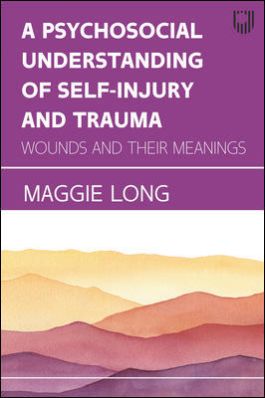A Psychosocial Understanding of Self-injury and Trauma: Wounds and their Meanings
1st Edition
0335249574
·
9780335249572
© 2022 | Published: January 26, 2022
“Drawing on research, theory and survivor wisdom, A Psychosocial Understanding of Self Injury and Trauma provides a clear, down-to-earth and practical guide to supporting people who self-injure.”Helen Spandler, Professor of Mental Health, UCLan U…
Read More
Request Review Copy
Receive via shipping:
- Colour, print bound version of the complete text
PART ONE: CONTEXT
CHAPTER ONE: Introduction
CHAPTER TWO: Defining Self-Injury
CHAPTER THREE: Understanding Self-Injury: APsychosocial Lens
PART TWO: APPLICATIONS
CHAPTER FOUR: Help Seeking for People who Self-Injure
CHAPTER FIVE: Counselling for Self-Injury:Relationship Matters
CHAPTER SIX: Self-Injury in Response to Trauma and theCase of Northern Ireland
PART THREE: CONCLUSIONS
CHAPTER SEVEN: Conclusions
“Drawing on research, theory and survivor wisdom, A Psychosocial Understanding of Self Injury and Trauma provides a clear, down-to-earth and practical guide to supporting people who self-injure.”
Helen Spandler, Professor of Mental Health, UCLan UK; Editor, Asylum: the radical mental health magazine
“This is a very welcome book, which is authoritative and engaging in equal measure.”
Andrew Reeves, Professor in Counselling Professions and Mental Health, The University of Chester, UK
“In this accessible and instructive book Long has made excellent use of her inter-disciplinary knowledge to invite readers to engage with critical thought around self-injury.”
Fiona Stirling, Lecturer in Counselling, Abertay University, UK
“Maggie Long’s wise and humane study of self-injury offers an important contribution to understanding how personal wounds may come to be ‘written on the body’.”
Liz Frost, Co-editor of Journal of Psychosocial Studies; Associate Professor of Social Work, UWE, Bristol, UK
This book is a key resource for any student or practitioner in the helping professions who wishes to develop a holistic understanding of self-injury.
Debunking common myths and stereotypes, Long uses an interdisciplinary approach to help readers understand the people behind the symptoms. The impact of interpersonal, societal, and intergenerational trauma is considered in depth, as are the key practical implications for research, policy and practice this understanding of self-injury brings.
Though primarily aimed at Counselling and Psychotherapy students, Long considers the challenging processes of help-seeking more broadly, providing useful strategies for responding to self-injury disclosures for practitioners in a range of roles where counselling skills are used, including those in Social Work, Youth Work, Teaching and Nursing.
Maggie Long is a lecturer at Ulster University, Ireland. Her work is cross-border and interdisciplinary, drawing on her background in both sociology and counselling.
Helen Spandler, Professor of Mental Health, UCLan UK; Editor, Asylum: the radical mental health magazine
“This is a very welcome book, which is authoritative and engaging in equal measure.”
Andrew Reeves, Professor in Counselling Professions and Mental Health, The University of Chester, UK
“In this accessible and instructive book Long has made excellent use of her inter-disciplinary knowledge to invite readers to engage with critical thought around self-injury.”
Fiona Stirling, Lecturer in Counselling, Abertay University, UK
“Maggie Long’s wise and humane study of self-injury offers an important contribution to understanding how personal wounds may come to be ‘written on the body’.”
Liz Frost, Co-editor of Journal of Psychosocial Studies; Associate Professor of Social Work, UWE, Bristol, UK
This book is a key resource for any student or practitioner in the helping professions who wishes to develop a holistic understanding of self-injury.
Debunking common myths and stereotypes, Long uses an interdisciplinary approach to help readers understand the people behind the symptoms. The impact of interpersonal, societal, and intergenerational trauma is considered in depth, as are the key practical implications for research, policy and practice this understanding of self-injury brings.
Though primarily aimed at Counselling and Psychotherapy students, Long considers the challenging processes of help-seeking more broadly, providing useful strategies for responding to self-injury disclosures for practitioners in a range of roles where counselling skills are used, including those in Social Work, Youth Work, Teaching and Nursing.
Maggie Long is a lecturer at Ulster University, Ireland. Her work is cross-border and interdisciplinary, drawing on her background in both sociology and counselling.

